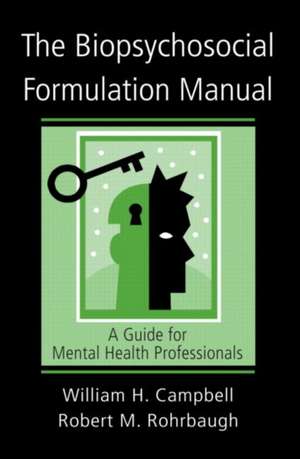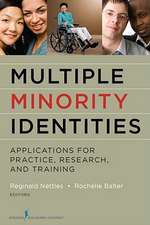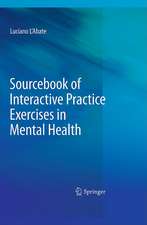The Biopsychosocial Formulation Manual: A Guide for Mental Health Professionals
Autor William H. Campbell, Robert M. Rohrbaughen Limba Engleză Paperback – 6 feb 2006
The process of identifying pertinent data for each component of the biopsychosocial formulation is explicated in detail. A separate section outlines how to use the biopsychosocial formulation to generate treatment recommendations. This volume includes a complete package for practicing the biopsychosocial method; this easy-to-use guide includes a data record sheet and downloadable resources to facilitate organization and assessment, appealing to both the psychiatric professional and the trainee.
| Toate formatele și edițiile | Preț | Express |
|---|---|---|
| Paperback (1) | 343.63 lei 43-57 zile | |
| Taylor & Francis – 6 feb 2006 | 343.63 lei 43-57 zile | |
| Hardback (1) | 791.30 lei 22-36 zile | +19.17 lei 5-11 zile |
| Taylor & Francis – 27 aug 2015 | 791.30 lei 22-36 zile | +19.17 lei 5-11 zile |
Preț: 343.63 lei
Preț vechi: 361.71 lei
-5% Nou
Puncte Express: 515
Preț estimativ în valută:
65.76€ • 68.31$ • 54.63£
65.76€ • 68.31$ • 54.63£
Carte tipărită la comandă
Livrare economică 03-17 februarie 25
Preluare comenzi: 021 569.72.76
Specificații
ISBN-13: 9780415951425
ISBN-10: 0415951429
Pagini: 176
Ilustrații: 3 black & white illustrations
Dimensiuni: 138 x 216 x 12 mm
Greutate: 0.22 kg
Ediția:1
Editura: Taylor & Francis
Colecția Routledge
Locul publicării:Oxford, United Kingdom
ISBN-10: 0415951429
Pagini: 176
Ilustrații: 3 black & white illustrations
Dimensiuni: 138 x 216 x 12 mm
Greutate: 0.22 kg
Ediția:1
Editura: Taylor & Francis
Colecția Routledge
Locul publicării:Oxford, United Kingdom
Cuprins
Introduction. An Overview of the Biopsychosocial Formulation Model. The Biological Formulation. The Psychological Formulation. The Social Formulation. Differential Diagnosis. Risk Assessment. The Biopsychosocial Treatment Plan. Prognosis. Putting it all Together. Appendix A - Other Psychodynamic Perspectives. Appendix B - Major Ego Functions. Appendix C - A Glossary of Psychoanalytic Terms. References. Index. Templates.
Notă biografică
William H. Campbell, MD, MBA, is Assistant Professor in the Department of Psychiatry at Case Western Reserve University School of Medicine and Medical Director of the Ambulatory Care Division at University Hospitals of Cleveland in Cleveland, Ohio.
Robert M. Rohrbaugh, MD is Associate Clinical Professor, Associate Residency Director of Medical Student Clinical Clerkships in the Department of Psychiatry at the Yale University School of Medicine.
Robert M. Rohrbaugh, MD is Associate Clinical Professor, Associate Residency Director of Medical Student Clinical Clerkships in the Department of Psychiatry at the Yale University School of Medicine.
Recenzii
"Drs. Campbell and Rohrbaugh have written a highly readable, practical, balanced, thoughtful and helpful guide to biopsychosocial formulation. It is sure to become one of the classics in the field of clinical psychiatry education."
- Dr. Anthony Rostain, MD, MA, Director of Education, Department of Psychiatry, University of Pennsylvania, USA
"Both authors are practicing and academic psychiatrists, and together they have designed a manual that offers a practical approach to organizing the wealth of data obtained from patients into some meaningful formulation. They have created a unique format that ensures appropriate emphasis of all three components delineated in Engel's original model (biological, psychological, and social). Even the most experienced clinician may discover that there are gaps in his or her typical formulation of patient complaints and, therefore, may find the manual useful in assisting him or her in more productively using the data collected. In my professional opinion, this book is one of those resources that should be in every trainee's and clinician's library.
- Frank M. Dattilio, in PsycCritiques, Contemporary Psychology: APA Review of Books
- Dr. Anthony Rostain, MD, MA, Director of Education, Department of Psychiatry, University of Pennsylvania, USA
"Both authors are practicing and academic psychiatrists, and together they have designed a manual that offers a practical approach to organizing the wealth of data obtained from patients into some meaningful formulation. They have created a unique format that ensures appropriate emphasis of all three components delineated in Engel's original model (biological, psychological, and social). Even the most experienced clinician may discover that there are gaps in his or her typical formulation of patient complaints and, therefore, may find the manual useful in assisting him or her in more productively using the data collected. In my professional opinion, this book is one of those resources that should be in every trainee's and clinician's library.
- Frank M. Dattilio, in PsycCritiques, Contemporary Psychology: APA Review of Books
Descriere
Based on George Engel’s model, The Biopsychosocial Formulation Method presents ways to help psychiatry residents and students effectively gather and organize patient data to arrive at a complete mental health history in a limited timeframe.










